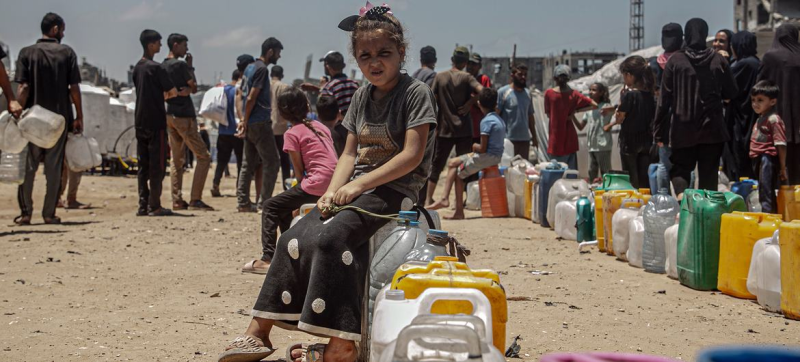- UN Report Calls for New Thinking to Secure a Sustainable Future |
- BNP moves to finalise seat sharing as alliance friction grows |
- BNP plans universal 'Family Card' for all women: Tarique Rahman |
- Tangail saree weaving gets recognition as intangible cultural heritage |
- Chuadanga farmers thrive as cauliflower yields hit new high |
Hunger and Heatwave Worsen Gaza’s Humanitarian Crisis

A child queues for water in Gaza.
As hunger and malnutrition deepen in the Gaza Strip, humanitarian missions continue to face delays and impediments, while scorching temperatures add to the population’s suffering.
Recently, Israel has denied fewer humanitarian movements, but approved missions “still take hours to complete, and teams have been compelled to wait on roads that are often dangerous, congested, or impassable,” the UN aid coordination office (OCHA) said in its latest update.
Between 6 and 12 August, humanitarians made 81 attempts to coordinate planned movements with the Israeli authorities, including the transfer of fuel and personnel.
Of this number, 35 were facilitated, 29 were initially approved but then impeded on the ground, 12 were denied, and five had to be withdrawn by the organisers. However, 14 of the missions that had faced obstructions eventually went ahead.
Nearly three years have passed since hostilities erupted in Gaza following the Hamas-led attacks on Israel, which left roughly 1,200 people dead. About 250 others – both Israelis and foreigners – were taken hostage. It is believed 50 are still being held in Gaza, including some who have been declared dead.
Starvation in the enclave is now at its highest level since the conflict began, according to the World Food Programme (WFP).
The update cites Gaza health authorities, who have documented 235 malnutrition-related deaths, including 106 children, as of 13 August.
Despite hunger spreading, aid convoys remain limited each day, and dangers persist as the trucks travel through the war-ravaged enclave.
“Additionally, desperate crowds often offload food supplies from trucks to feed their families – while looting also prevents aid from reaching its intended destinations,” OCHA said.
Last month, WFP collected 1,012 trucks transporting nearly 13,000 metric tonnes of food from the Kerem Shalom and Zikim border crossings with Israel. Only 10 arrived at warehouses; the rest were offloaded along the way.
Although WFP and partners have enough food either in the region or en route to feed all 2.1 million people in Gaza for at least three months, “the risk of spoilage and infestation of the stranded food supplies has significantly increased, and some are nearing their expiry dates.”
Humanitarians continue to push for more aid and commercial goods to be allowed into Gaza. Although more food is entering, the quality and quantity remain insufficient to meet the immense needs.
As of 10 August, 81 community kitchens were preparing 324,000 individual meals daily – a “noticeable increase” over the 259,000 daily meals prepared two weeks ago, but far below the more than one million daily meals distributed in April.
Meanwhile, a heatwave is worsening conditions as Gaza experiences temperatures exceeding 40°C (104°F).
The UN Palestine refugee agency (UNRWA) warned that dehydration is increasing due to the very limited water available.
As part of its ongoing efforts to help the people of Gaza, UNRWA has provided emergency water, sanitation, and hygiene services to about 1.7 million people since the start of the war.

